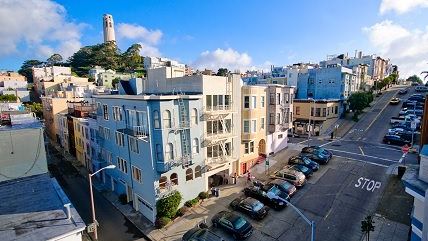Are Short-Term Rentals a Big Worry?
There's always a cat-and-mouse game between innovators and regulators

After my daughter got back from a nursing trip to a poor African country, she often joked about our "first world problems." There's even a funny series of Facebook memes to that effect showing upset Westerners struggling because they lost the remote control or had to wait five minutes at the coffee shop.
I chuckle, but don't see these as first-world problems per se. They are just life's little annoyances. The real first-world problem is our society's obsession with regulating everything everybody else does, even if it doesn't really harm us. This is especially true with land-use issues, including ongoing local battles over Airbnb and other Web-based companies that offer short-term vacation rentals.
San Diego residents have long struggled with the issue. Perhaps it's the price of living in such a beautiful place that people travel across the world to vacation there. It also reflects the price of real estate, which forces some owners to find innovative ways to pay the monthly mortgage. But now Sacramento city officials have joined the fray.
My wife's family rented a house for a few days during a wedding, but most people aren't clamoring to spend summer days in the flatlands of the Sacramento Valley, enjoying the 105-degree temperatures. But regulations have a strange way of spreading from community to community. (I once moved from one of the cheapest housing markets in the country, Lima, Ohio, to one of the most expensive, Orange County, yet found housing officials in both places promulgating almost identical affordable-housing rules and regulations.)
Members of a group called Save San Diego Neighborhoods wrote in the Union-Tribune last month that the "fundamental problem" with these rentals is the incompatibility of "mixing strangers with residents." They complained about the harm this is doing to the hospitality industry, to the school system and the housing market.
Opponents of these short-term vacation operations often focus on unruly parties and misbehavior by some guests. But current codes, rules and neighborhood decorum already govern such things. Many people have had to live with nearby residents who routinely misbehave, from having loud parties and arguments, to parking too many cars on the streets and whatnot. The basic rule (at least in a moderately free society) is to punish "externalities", i.e., the outward misbehavior, rather than pre-emptively stopping people from doing things.
The San Diego housing market is doing fine. The school-system argument (rentals are leading to lower enrollments) is weak. Property owners still pay real-estate taxes and many things reduce enrollments. Should we limit retirees for the latter reason?
It's really hard to worry about the multibillion-dollar "hospitality industry." One news report found that anti-Airbnb efforts in New York City were funded by the American Hotel & Lodging Association. No surprise. This current battle is reminiscent of the taxi industry's use of government to essentially shut down, or hobble, Uber and other ride-sharing platforms. There's always a cat-and-mouse game between innovators and regulators, which often try to strangle an emerging industry in the crib (on behalf of influential interests).
The neighbor/stranger argument is a head-scratcher. Some neighbors are friends and others are strangers. I've had neighbors whom I wished were strangers. It's really not government's role to try to protect subjective conceptions of an ideal neighborhood.
Indeed, famed urban writer Jane Jacobs made a distinction between the design of suburban and urban neighborhoods, with the latter geared for strangers and the former for residents. But all land-use planning these days involves New Urbanism, which is trying to increase the level of urbanization throughout our communities. Maybe Airbnb is just part of that trend.
In most places, the vacation-rental movement will be self-limiting. Even if Sacramento doesn't require expensive permits, the payment of occupancy taxes and time restraints on vacationers, it's unlikely more than a handful of homes in any neighborhood there will be used for out-of-town guests.
In vacation areas such as San Diego, it's different. Then again, people living in beachfront areas already have to put up with the traffic, passersby and noise. Such is life when you get to live in one of the world's idyllic places. In the scheme of things, maybe this isn't the worst problem.


Show Comments (7)